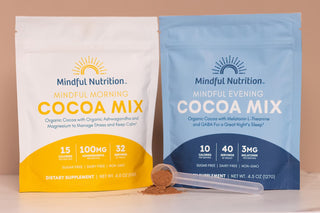Wondering why everyone is obsessed with cocoa nibs? There's a reason the ancient Mayans believed they were a gift from the gods.
Read on for the science-backed potential benefits of these little chocolatey wonders, and some suggestions on how you can incorporate them into a healthy diet.
Key Takeaways
- Cacao nibs, or cocoa nibs, are made by drying and crushing cacao beans into little bits.
- They have a unique, distinctive taste, which is far richer (and a little more bitter) than even dark chocolate.
- Cocoa nibs are an excellent source of essential minerals, are naturally low in sugar, and are packed with powerful antioxidants.
- As such, they provide multiple potential health benefits, from supporting heart health to promoting an uplifted mood.
- You can add cocoa nibs to both sweet and savory dishes, and can even turn them into hot chocolate (or add them as a topping to your favorite organic cocoa mix).
See Related: The Delicious and Interesting History of Hot Chocolate
What Are Cacao Nibs?
Cacao nibs, also called cocoa nibs, have exploded in popularity in recent years. The global market is worth over $1.5 billion and is set to grow by another billion dollars by the end of the decade.
If that surprises you, keep reading. Cacao nibs come with plenty of potential health benefits, and they're delicious to boot. At least, if you know what to do with them.
Before we get to all that, we need to explore what, exactly, cacao nibs are.
Cacao Beans
You've likely heard of cacao beans, or cocoa beans. Produced by the cacao tree, these beans are the central ingredient to cocoa and chocolate products.
To make cacao nibs, the cacao beans are harvested, dried, fermented, and then cracked or crushed into small chunks. These are cacao nibs!
The cacao nibs may then be roasted. If they are, they're called roasted cacao nibs. And if they aren't, they're called raw cacao nibs or unroasted cacao nibs.
You might also see some brands advertising organic cacao nibs.
Cacao's Unique Chocolate Flavor
At first glance, you might assume these crushed cocoa beans are similar to chocolate chips. And to some degree, cocoa nibs can be used like chocolate chips.
But that doesn't mean they taste the same.
Actually, cacao nibs have a very unique taste. They're extremely rich, with an intense chocolate flavor. Unlike many other chocolate products, they are naturally low in sugar, which results in a somewhat bitter taste.
Don't let that put you off, though. It makes cacao nibs extremely versatile, able to improve sweet and savory recipes alike. Plus, they offer a delightful crunch.
Oh, and cacao nibs are naturally gluten-free.
Bonus: Is Hot Chocolate Good For a Sore Throat?

Nutritional Benefits
Cacao nibs might be small, but they're packed with nutrition. For one thing, their relatively low sugar content makes them an excellent way for chocolate lovers to satisfy their chocolate cravings without eating loads of added sugar.
According to the USDA, a single ounce of cacao nibs contains just 1 gram of sugar, 3 grams of protein, 15 grams of fat (including healthy fats), and 5 grams of fiber. Cacao is also a good source of iron, magnesium, zinc, and other essential minerals.
Potential Health Benefits
As if all that wasn't enough, research suggests that cacao comes with numerous potential health benefits.
Antioxidants
Cacao is packed with cocoa polyphenols and cocoa flavonoids, antioxidants that help protect the body from oxidative stress. That's damage caused by molecules called free radicals, which cocoa's antioxidants can help neutralize.
By potentially protecting the body's cells from this damage, antioxidants are thought to provide numerous potential health benefits. Research has found that people with flavonoid-rich diets are less likely to experience mental decline.
Mood
You probably know how much chocolate can boost your mood. But did you know that's been proven by multiple studies?
For example, one study from 2022 found that people who ate dark chocolate every day were less likely to report negative mood states than others. And an analysis of multiple studies concluded that cocoa-rich products improved symptoms of sadness and stress.
Now, all chocolate might make you feel better in the short term, but not all chocolate is created equal. White chocolate has the lowest concentration of helpful compounds like antioxidants, and is usually higher in fat and sugar. Milk chocolate is a little healthier, while dark chocolate provides that chocolatey flavor with even less added sugar and fat.
Cacao nibs might be even better. Unlike many dark chocolate bars, cacao nibs often have no added sugar at all. As a raw food, they may also contain more antioxidants that would otherwise have been lost in processing.

Immune System
You might not think of chocolate as a food to eat when you're under the weather, but think again. Research shows that cocoa can influence and even support the immune system. That's why some people turn to sugar-free hot chocolate as their drink of choice when they have a cold.
Blood Sugar
Studies suggest that cacao can help the body manage normal blood sugar levels. For example, one study found that people who ate high-polyphenol dark chocolate every day for two months demonstrated better long-term blood sugar control than a control group.
Ways You Can Enjoy Cacao Nibs
Cacao nibs can be eaten raw, and their crunchy texture makes them a great addition to dishes like granola or as a topping on ice cream.
Chocolate enthusiasts looking for a healthy alternative to chocolate can substitute cacao nibs for chocolate chips in recipes for cookies and brownies. You can also blend them into smoothies for a drink rich in antioxidants with a chocolatey taste.
Add Cacao Nibs to Hot Chocolate
Cacao nibs can also make a great addition to hot chocolate! If you want to go all-out, you can grind up your nibs and make hot chocolate from scratch.
Alternatively, add them (as a powder or as a topping) to your favorite hot cocoa mix.
If you want to minimize sugar, consider using them with one of our sugar-free hot cocoa mixes. Our Organic Skinny Cocoa Mix contains just 10 calories per serving, while our Mindful Evening Cocoa Mix for Sleep blends high-quality cocoa with melatonin, L-Theanine, and GABA for a great night's sleep.
Conclusion
So, are cacao nibs worth the hype? As you now know, they come with plenty of potential health benefits. They might be an acquired taste for some, but millions enjoy their rich flavor, and they’re a great way to boost your cocoa intake while sticking to a healthy diet.
You can add them to your morning granola, blend them into a savory recipe, or use them to top off your hot chocolate. The possibilities are endless!
Keep Reading: Can Drinking Hot Cocoa Help With a Cold?

Frequently Asked Questions
Are Cacao Nibs Good For You?
Cacao nibs are packed with healthy fats, essential minerals, and powerful antioxidants. As such, they provide numerous potential health benefits.
Of course, like anything, you can have too much of a good thing. But when enjoyed in moderation, cacao nibs have been shown by research to help support heart health, gut health, mental health, and more.
Do Cacao Nibs Taste Like Chocolate?
Yes. Or, at least, sort of.
That depends on what you mean by "chocolate." Because cacao nibs don't have any added sugar, they won't be as sweet as most chocolate bars.
Instead, they have an intense, rich flavor. The closest chocolate equivalent might be unsweetened dark chocolate.
Is Dark Chocolate the Same as Cacao Nibs?
Not quite. Dark chocolate is generally processed. The cacao is combined with sugar, milk, and potentially other ingredients, too.
Meanwhile, cacao nibs are usually nothing more than dried cacao beans that have been crushed into little bits. As such, they are usually more bitter, nutty, and rich than dark chocolate.
--
Mindful Nutrition is a veteran-owned company with a passion for wellness. We use natural ingredients in our products, including melatonin, GABA, ashwagandha, and L-Theanine. Our hot cocoa blends are vegan, non-GMO, and plant-based, crafted to be a comforting addition to your daily ritual. We utilize third-party testing on all products to ensure purity, quality, and safety. To stay connected and learn more, follow us on Facebook, Instagram, and LinkedIn.
--
These statements have not been evaluated by the Food and Drug Administration. Our products are not intended to diagnose, treat, cure, or prevent any disease. The content on this website is for informational purposes only and is not intended as a substitute for advice from your physician or other healthcare professional. Always consult with a qualified healthcare provider regarding any medical condition or health concerns.














